Europe’s decision to respond to the Russian invasion in Ukraine with sanctions, excluding the Russian oil and gas industry, conceals a very uncomfortable truth that Europe (as it currently stands) cannot create more hurt for the Russia economy without devastating the Continent’s own economy in return.
The deafening absence of retaliatory measures against Russian oil and gas reflects the region’s deep reliance on Russian hydrocarbons, a position that has grown as a result of the EU’s commitment to phase out its more polluting dark and brown assets from its power generation-mix over time, and due to its approach of utilizing natural gas as the “bridging” energy resource for its transition to net-zero.
Without a doubt, the Russian energy commodities that have inundated Europe for decades are crucial, in the medium term, when it comes to replacing the Continent’s already limited oil and gas resources, additionally also providing cover for rising EU energy demand levels until an alternative sustainable-supply pathways can be found.
Whilst the aging reserves in the North Sea have already reached peak production levels, expanding existing fields can take years, if not decades, while plans of building an on-shore industry has been non-existent following the latest UK government statements that there are no intention of lifting the fracking moratorium introduced back in 2019 in order to boost gas supply for the region.
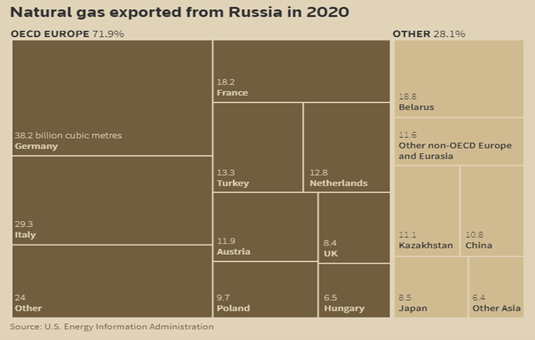
Adding to the issue was the reduced French nuclear output outlook for the entirety of 2022 and after France’s EDF announced its reduced nuclear electricity capabilities back in late-December 2021. Coupled with the slowdown in Groningen gas field productions that began almost a decade ago due to adverse seismic activities in the Netherlands, Dutch gas production have persisted to decline and have further adversely affected Europe’s energy supply security considering this single gas fields was able to provided over 10% the region’s energy demand once upon a time.
Potential oil and gas sanctions would be detrimental, particularly for EU’s largest economy – Germany, which halted all of its nuclear power operations in the aftermath of the Fukushima nuclear disaster (back in 2011) and began prioritizing coal reduction to achieve the region’s carbon neutrality targets, jeopardizing North-West Europe’s energy security, as the region remains vulnerable to such severe supply miscalculations.
For decades the two countries have been tied to a strong energy partnership, which accounted for 45% of Germany’s total gas consumption of approximately 85 billion cubic meters, 34% of its oil, and 53% of hard coal used in power generation and steelmaking, indicating that its industrial production and economic stability cannot risk losing the feedstock (out of Russia) for its production engine.
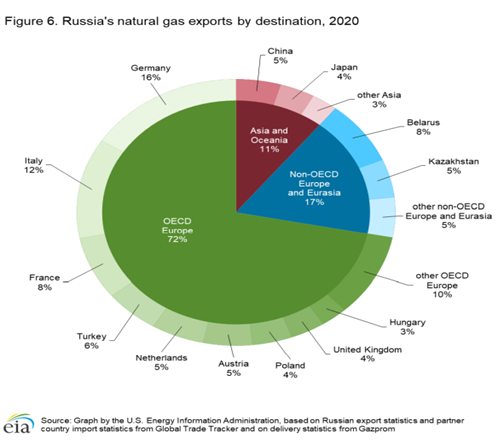
However, according a report by the Institute of the German Economy (IW-Koeln), trade relations between Russia and Germany worsened after the EU’s imposed sanctions of 2014 back when the total movements of goods and services between the two countries fell by $33 billion dollars, from $75 Billion (in 2013) to $42 Billion, just seven-years later (2020). As the biggest manufacturing economy in Europe, Berlin still stands as Moscow’s second-largest trading partner – only after Beijing, with trades equating to ~7% of the total trades done by the Russian Federation due to Berlin’s estimated $25 Billion of investments in Russian production plants and other assets.
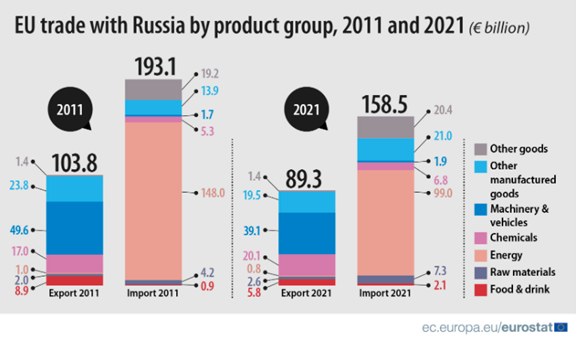
Without a doubt, the operation of Nord Stream 2 was expected to become the most important factor for European energy supply-security, storage and prices stability. A feature that would have been based on steady-reliable gas exports from one of the world’s largest exporter of energy commodities across the European landscape.
The German Chancellor’s prolonged suspension of the Nord Stream 2 certification process are now expected to further exacerbate the region’s turmoil in terms of gas supply efficiency, something desperately needed as the Continent’s total energy consumption levels cannot be feasibly replaced with existing LNG terminals – or via the limited number of globally available cargoes that the US, Australia and Qatar can supply through – particularly during periods when demand for gas in Asia are high.
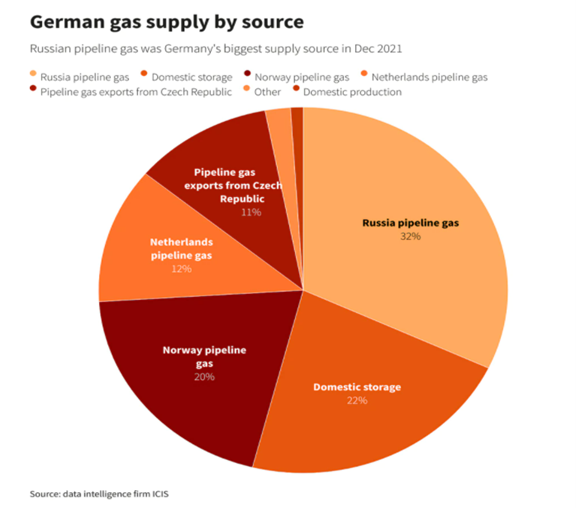
Any additional trade restriction and sanctions from the EU – also covering the energy-sector – raises the risk that the Continent’s next round of economical limitations on the Russian economy may cause greater harm to its own economy as of result of the double-edge nature of the financial-sword at play. Moscow’s military operations (in neighboring Ukraine) come with significant risks to their ability to do business between Russia and European Union having already seen a near 50% declined, from $393 billion, to $192 billion in 2020 – albeit this still ranked the EU as Russia’s biggest economic and trade partner.
However, due to the tight supply capabilities of the global energy market and given the necessity for European storage to be filled before the start of next winter (2022), energy prices look to continue trading at the current high levels in order for the EU to attract all the LNG cargoes necessary. This necessity for elevated EU energy contract valuations will be needed if the Continent is expected to outbid the Far-East Asian nations (China, Japan, Korea and others) that tend consume up to 2/3 (+65%) of the world’s total energy supplies yearly.
Russian Weaponization of Energy in Europe – Moscow’s Political Trump Card
The latest Russian sanctions – affecting the infamous Nord Stream 2 pipeline – will weigh upon Europe with an immense degree of adverse issues across the Continent due intertwined business requirements. As of result, the need for unhampered energy supply into the Continent – for the replenishment of gas stockpiles and for supply-secure needs cannot – will raise return this topic back to the limelight and put Europe in front of important decisions as the war continues in Ukraine. The necessity of supply diversification has become an imperative for the EU even with a scenario that may somehow see the currently blocked Nord Stream 2 pipeline become operational in late 2022, and the green agenda requires to be expedited and strengthened with more European funds targeting green transformation.
Europe felt the consequences of decreased Russian flows between January 1st & March 15th, when Gazprom’s natural gas shipments – to Europe and Turkey – fell by 28.5%, down to 30.7 billion cubic meters (bcm), compared to the same period in 2021.
Considering that, energy diversification involves the undertaking of long-term project. There is currently little space left for the balancing of European market with spare global capacity for the next years to come – up until 2025, as the world’s LNG terminals are running near full capacity and future gas production increases continue to be time consuming with very costly processes requiring colossal investments into infrastructures.
This underlying energy supply concerns in Europe will have enormous impacts on the future prospect of the Continent’s economic growth, as higher energy prices will keep pressure on cost of manufacturing and products, thus reducing overall economic activities across the region. Policy transformation incentivizing energy transformation and speeding-up the decarbonization process now needs to be taken into serious consideration.
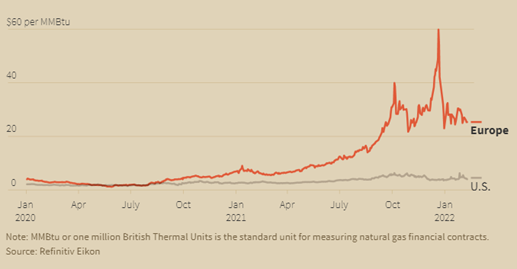
Furthermore, Russia’s presence in the global LNG scene, as one of the largest LNG suppliers, means Europe will have fewer alternative options as it struggles to refill European gas inventories without the need to aggressive bid for cargoes destined to Asian markets, particularly in months when demand for gas is strong across the Far East.
The latest tension with Russian not only affects the direction of the European energy agenda, but has also made the need of a diverse pool of energy suppliers more exigent, accelerating the Continent’s transition to ‘green’ energy and the financing new projects in both nuclear & renewable energy sector.
The potential stricter sanctions, that may be imposed on Russian oil and gas exports, would significantly disrupt EU markets due to the lingering fear that Moscow could also retaliate by further reducing flows into the region by taking retaliatory action that will only add to the existing gas supply shortages – further exacerbating the tightness already causing a spiral move in the region’s wholesale energy markets.
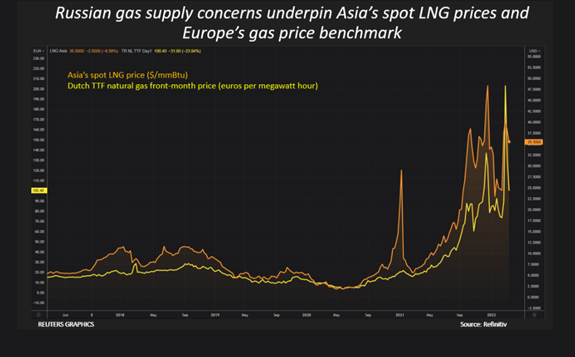
As Germany’s stockpiles, stored in one of the largest gas reserve facilities in the world, lags behind 2021 levels, the current prices level may remain present for longer and in order to help future demand levels be equalized with global supplies, something that will aid with the avoidance of regional blackouts and power outages.
However, as the predominant scenario going into the latter-half of 2022 remains that Russian energy exports (oil & gas supplies) will not to be impacted by severe EU sanctions. This scenario should allow for Gazprom to continue fulfilling its existing contracts – as they did even throughout the 1990’s “Cold-War”, only leaving the Continent to simply ponder whether (or not) those established gas-flow nominations will be sufficient to refill the EU’s low gas stockpiles ahead of Winter 2022.
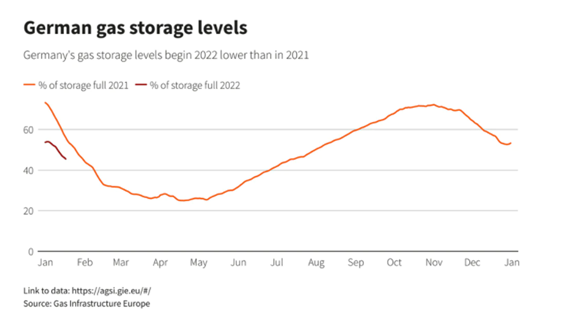
Conclusion – Europe’s Rough Road Ahead
Although the predominant scenario remains that oil and gas supplies, from Russia, will not to be severely sanctioned or impacted. Europe is still facing its larges humanitarian crisis since World War II with even higher inflationary pressures, due to the soaring energy prices and lower economic growth, acting as hindrance to the block’s current geopolitical instability or ability to effectively punish Moscow.
Knowing that in crucial times when decisions taken shape the future of nations for decades to come, Europe’s chronic pathogenicity tends to emerge to the surface as the individualistic nature of each country are greatly manifested. Without being a solid monetary union, with common revenue streams, on-going expenses and equally supported economies, this inevitable nature of politics may lead EU countries to diverge from one-another in pursuit of national interest, a result of their different economical structures and exposure to various type of exogenous global shocks.
Considering the current energy crisis in Europe weighing on the region’s economic outlook due to the sustained period of soaring gas, electricity and coal prices, each European Nation – with different reliance to Russian gas – will eventually endeavor to promote their own agendas, by focusing on national interest before working in unity with the rest of the block. As result of this underlying need to preserve national interest, half of EU countries have supported sanctions on Russian oil and gas, whilst the other half have refrained from calling for harsher restrictive measures due to internal disputes.
Although Europe imported a record high volume of gas, nearly 11 bcm of LNG in January, with nearly half of this supply coming from the United States, the quantity was still deemed marginal when it came to covering the Continent’s gas demand or abating recent surges in wholesale markets. In addition to this inflow of LNG tankers and despite Europe’s decreasing reliance on Russian export over the last ten-years, oil and gas still holds the lion’s share as Europe’s most utilized fuel for the Continent’s economic steam engine.
The unprecedented volatility and surge in prices are expected to have a significant impact on Europe’s economic growth – risking a Continent-wide business activity slowdown through the latter-half of the year (2022), where an inflation spiral appears to be even more likely over the months to come, increasing the probability another global recession.
Apart from the new dynamics that the current geopolitical tension and energy crisis have created, Europe faces some of its most fundamental change when it comes to its access to energy supplies in the global scene. Undoubtedly, any EU & US sanctions imposed on the Russian energy sector will affect Moscow’s finances, in the short term, as its exports into the Continent accounted for 72% & 48% for gas and oil (respectively).
However, the ramification of this potential scenario – where stricter sanctions are imposed to Russian energy Russian – will damage European nations at a greater extent due to the lack of any viable supply alternative to replace Russian more than 150 billion cubic meters (bcm) of gas powering the Continent.

